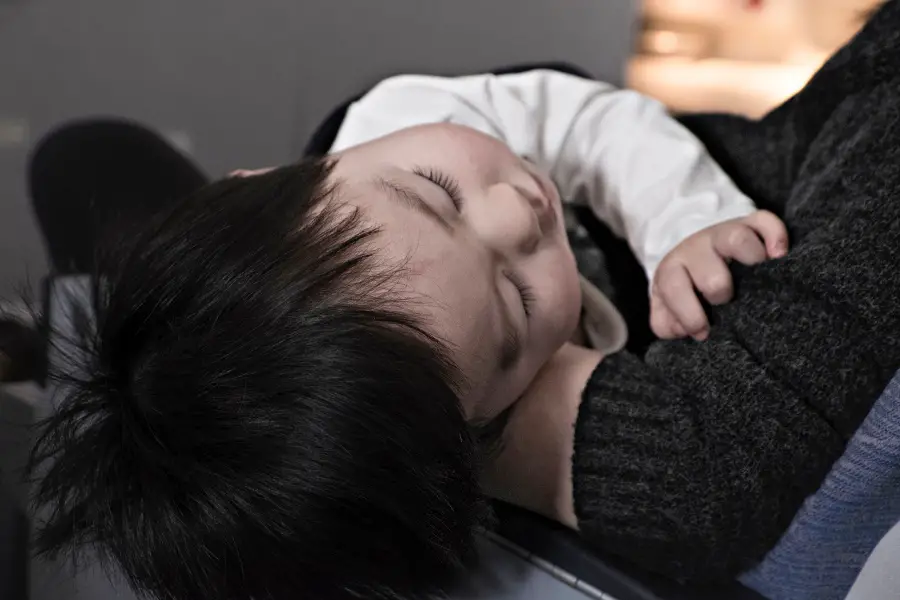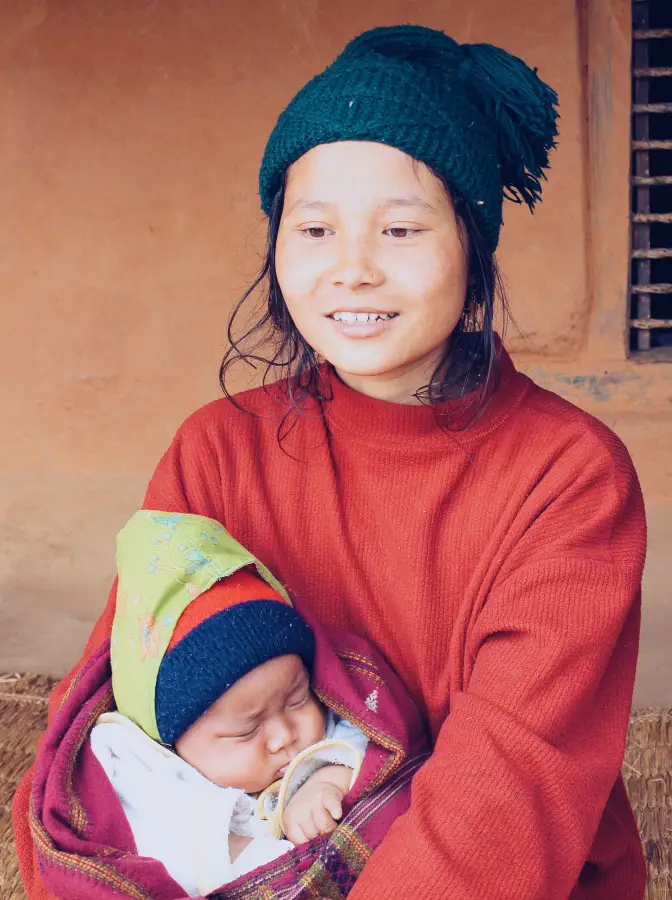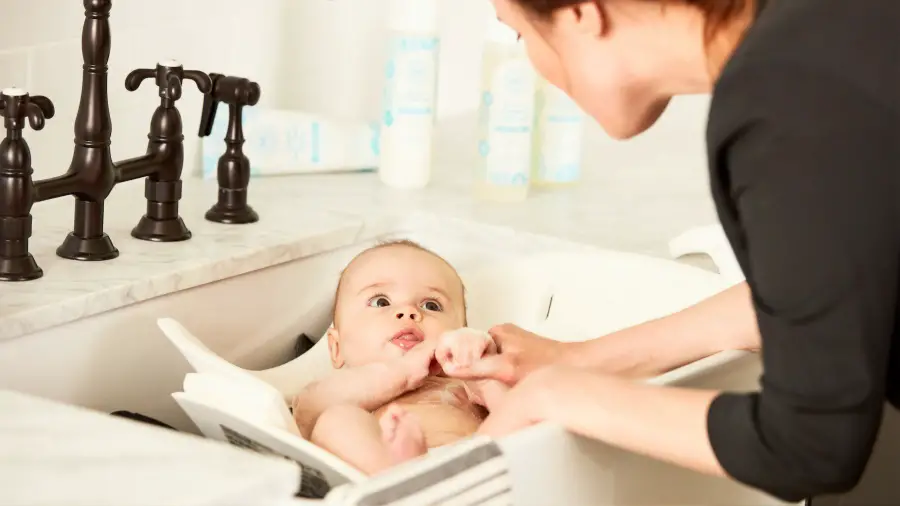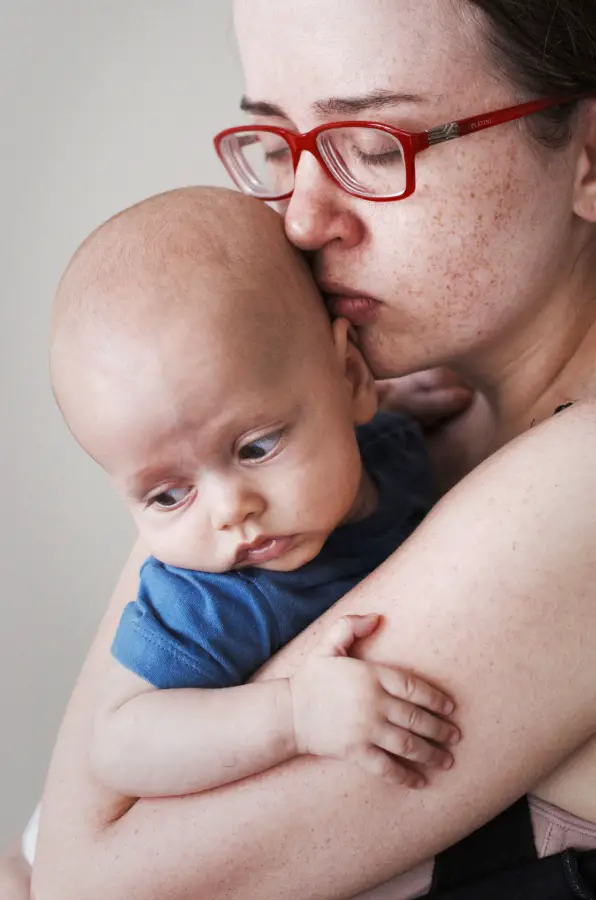How to Survive Your Baby’s First Cold?

Most infants are pretty resilient and can go almost a whole year without a cold, and other infants might have siblings who end up bringing home more germs from schools so your infant ends up catching a cold quicker. One of the most common colds infants get is RSV, which is called a respiratory syncytial virus. Most infants who get the virus experience cold-like symptoms and recover with no issue.
Then there are babies that get ear infections and fevers that go along with teething. Parents should be prepared for their infant’s first cold. They should know that their child will be cranky and probably not sleep very well.
The first thing to do is call the doctor if you notice they have a fever or are wheezing. Infants under the age of 8 weeks should not be getting a fever and if they do, it’s definitely important to call your pediatrician and he will tell you to take your child into either urgent care or the emergency room if it’s during the middle of the night.
Babies are More Susceptible to the Common Cold
Cold’s are named common for a reason and many healthy kids get eight to ten colds a year, while others get viral infections during the first couple years after they are born. This happens because babies immune systems are still developing and aren’t that strong yet to fight off infections. This doesn’t mean that you didn’t dress your child warm or they happened to get a cold draft.
Sometimes colds just happen to overlap and as one cold ends, your baby gets another cold. New parents often feel very overwhelmed because of the continuous case of cold symptoms are also exhausting to your child and to the parents. Don’t be afraid to ask the child’s doctor if you’re starting to worry about your baby, especially if they are less than 3 months of age.
Here are some things you should know about the cold season when babies are newborns. This includes the causes, duration of the cold and the treatments.

Cold Symptoms
Most of the symptoms in infants are not dangerous and might have these symptoms:
They might have a runny nose that starts out watery, then the color turns translucent and ends up being yellowish-green. They could suffer from a stuffy nose in their nasal cavity, with sneezing and occasionally a mild fever. Sometimes their cough is dry and could become worse during the evening hours because they are tired at the end of the day.
Occasionally, the cough may get worse as the cold is ending. In addition, they could suffer from a sore throat that can become scratchy and is hard to tell with your baby. They also become very tired and grouchy and will lose their appetite.
The call is to starve a fever and feed a cold. The reason is when babies have fevers, they are more likely to vomit and if they are recuperating from a cold, then it’s good to keep feeding them so they get their strength back.
Causes
Colds, turn into upper respiratory infections, which comes from a virus. Viruses spread through the skin from one person to another. These viruses are spread through the transmission of droplets from sneezing and coughing and coming into contact with contaminated objects.
This includes holding, lip contact, contamination of toys, snuggling your child when a sweet infant is near can cause the cold virus to spread. There are over a whopping 200 viruses that cause colds, and this is the answer to why they are regular colds.

All babies and young ones have many dripping noses because their immune systems are still weak against all of these numerous numbers of cold viruses that are circulating around. These colds can really be hard on your infant’s nose, but this won’t cause any harm to them. The good thing is that these germs are good for your child’s body because this is how their immune systems develop by catching these bugs, which in turn cause kids to become less likely to have the same infection in their later years.
The Length of the Common Cold
The regular cold usually lasts from a week to almost two weeks, with the third day being the worst day for the baby. Sometimes, a cough might hang on for longer than 10 days as well. The incubation period for a cold is between under four days.
Colds become very contagious a few days before parents notice the symptoms, and could still be passed on when the cold is already in your child’s system. Once your child loses the runny nose, the cold is not likely to be very contagious.
How to Take Care of Your Baby’s Cold?
Make sure you talk with your doctor before using any medication for your baby. Babies should not take cold medicine for adults because the alcohol content is strong. So in order to help baby with their cold symptoms during the cold months, check out some of these tips:
It’s a good idea to watch the mucus because a stuffy nose can be miserable for your baby. This makes it hard for them to breathe and no one is going to get much sleep. A good idea to try is a suction bulb so you can take out the extra mucus. You can also buy over the counter saline drops because they help make the mucus easier to extract.
Make sure you have enough humidity in your home so try using a humidifier in your child’s room that circulates cool mist. The mist makes the air moist and it’s known for reducing congestion in babies. When they have a fever and sweat, they are losing their nutrients so replacing fluids is important.
You can also feed them chicken broth but make sure you strain it or put it in a sippy cup. Make sure it’s slightly warm but not too hot. If your baby is eating solid foods, give them very nutritious foods and especially vitamin C.
If your baby is too young yet, keep on breastfeeding. You should also be aware of which medications are appropriate to give to baby. Make sure you read the directions. You may give babies some Tylenol if they are older than two months, and ibuprofen if your child is over 6 months old. It’s always a good idea to ask your doctor before you give your child any medication.

How to Prevent a Baby’s Cold?
The sad thing about a sick baby is there is no way to entirely protect your baby from the common cold viruses. There are some things you can do to help and the number one rule is to constantly wash your hands regularly, especially after a diaper change. If you can’t make it to the sink right away, use some good hand sanitizer or wipes will work but remember that soap and water is the best route to go.
In addition, if anyone is coming over that has a cold, tell them that you don’t want your baby catching a cold and if someone is sniffling, use a good disinfectant when they leave. Wash and clean all surfaces that the person may have contaminated with their hands or cold germs. Clorox Cleanup is a safe product to use, along with any kind of Clorox or Lysol wipes. Breastfeeding is great for building up your child’s immune system, but it’s not foolproof.
When to Call the Doctor?
In most cases of the common cold, there is no reason to visit the doctor, however; if your baby is under 3 months old or if it’s their first cold, it’s probably a good idea to call the doctor to put yourself at ease. Always watch for these signs if you notice your baby is getting worse and call the doctor:
- If your child is experiencing their first cold
- Your child is restless and seems not to respond, or seems to be in pain during the night, which is hard to figure out in infants
- Lethargy
- Refuses drinking or eating
- Has a fever over 100.4 if they are 0-2 months or over 101.5 in babies older than 2 months.
- Has a cough that keeps getting worse or keeps continuing all day after the rest of the symptoms are gone.
- Breathes very rapidly
- Has a bad-smelling greenish-yellow discharge that is coming from the nose of mouth
- Swollen glands
- Rubs their ears
- Symptoms lasting longer than 10 days

When your baby seems to have a constant and continuous cold, a chronically runny nose or long-lasting colds that are frequent with dark circles under their eyes, ask your doctor if your baby might have allergies although these are rare in newborns.
Summer Colds
Babies get colds during all 4 seasons of the year and colds don’t appear because the weather is cold, not wearing a hat, getting their feet wet or being around a draft, even though a draft can cause a baby to become chilled, which can lower their immunity. During the cold months, colds happen because your baby gets a virus in their noses, and the viral infection in humans starts in the nose as well. Viruses are more abundant and active in colder weather from fall to spring.
Summer colds can still attack your baby because these colds are caused by whole different kinds of viruses: and some of these, which affect tissues in the body, and these are more common in the eyes, nose and digestive system. Internal viruses can cause up to quite a few million people to get sick yearly. This usually occurs between summer and fall.
Viruses will end up leaving the body, the same way as the any cold, it’s still important to ask your pediatrician about your child if their symptoms are lasting over 10 days, and they have a fever, are vomiting, having problems breathing or have a rash.
The most common symptoms of internal viruses are:
- Fevers in children
- Throat problems in children
- Headache issues in children
- Aches in Muscle tissue in children
- Nausea with children
- Vomiting with children
The problems usually go away in a few days to a week. It’s important to take care of your child and stop the colds in babies in the summer, the same way parents do with the winter cold. Always wash your hands and baby’s hands frequently with soap and water and call the doctor if you notice anything unusual.
Some parents feel they don’t need any tips if their baby has their first cold in the summer, but remember babies can and will catch a cold any time of the year and not just during the winter season. Air conditioning is a major culprit because it can cause problems on those tiny sinuses. There are never enough tips to read about when parents have to survive their baby’s first cold. So it might be important for you to write down questions and ask your pediatrician.
Face it all moms suffer from sleep deprivation with a new baby. Your mind is racing with a million questions, yet when you call and talk to the nurse, you suddenly are tongue-tied, and all those questions disappear. The only one that can advocate for your baby is you.
Therefore, you have every right in the world to ask about any questions you want. Don’t ever feel bad about asking questions to help you care for your family in a better way. Keep track of all your baby’s dirty and wet diapers, feedings and sleep schedule in case you want to share this information with the pediatrician, especially if you are the one with the fever.

Keep Your Schedule Simple with a Sick Child
Cut yourself a break when you have a sick baby because days are hard when you have a fussy little one. You’re going to have to accept that these are the days that you can’t follow your normal routine, and the laundry and housework might have to wait. Your hair might also have to wait and just pin it up.
Stop the Spread of Germs if Possible
If you wish to stop the rest of the family from getting the common cold try these tips:
- Have everyone wash their hands frequently
- Don’t touch your face, eyes or mouth
- When you feel run down and feel like coughing or sneezing, cough or sneeze into the bend of your arm, and not into the hands
- Disinfect remote controls, door handles. Cellphones, etc.
- Eat healthily and get enough rest
- Drink lots of fluids to keep your immune system healthy, when too many germs are around
Saline Drops and Bathroom Steam
Enough can’t be said about using saline drops and steam from the bathroom or a steamer with water that acts as a humidifier to loosen up mucus in your baby’s lungs. When you are taking care of an infant with an upper respiratory infection, this involves more comfort than treatment. Ask your pediatrician what they think about saline drops to loosen thick mucus to clear out the infant’s tiny nasal cavities so they can breathe easier.

Bathroom steam also is a big help when it comes to loosening up some of your baby’s congestion. Try and sit comfortably in your bathroom while running hot water from the shower to steam up the area. Make sure the door is closed. Snuggle your child as you sit in the steam for 15 minutes or so to help your child breathe easier and be more comfortable.
Patience
Patience sounds easy enough with a sick baby but is often hard to remember when you are trying your best and your child is laboring away with congestion. Sick babies cause the mother to worry frantically and this leads to impatience with themselves and the rest of the family. All that constant holding and soothing the baby takes a toll on anyone’s patience so it’s important to find someone who can help you take a break for a half-hour to recoup.
Emotions run high and fuse become short when one is experiencing deep congestion and the days and nights seem to go on forever. Practice some patience by breathing deeply, take a few short naps when you can, or squeeze in a quick shower because it’s refreshing and can help you get a second wind for the day.
Stock Up
The best thing to do when you have a baby is to stock up on supplies before your baby gets their first cold. You’re not going to have time running to the store once your child is sick. Make sure you have a thermometer, humidifier, saline drops and the right medication for your child stocked in your bathroom. This will help you save some anxiety if your child starts getting their first cold. Always remember not to be afraid to call your pediatrician to make sure you are giving your baby the right medication dosing and brand.

The First Two Months can be Stressful
Before baby’s get their first shots, they are more open to infections. This is because young infants don’t have the antibodies to fight off these colds and infections, so the risk is higher for them to get these infections. Don’t invite too many people over the first few months because this limits the number of people holding your baby.
If you do go out and take your baby with you, kindly ask people to wash their hands before coming too close to your child. This will help guard your baby against germs spreading during cold and flu season.
Keep Your Baby Very Close to You
There’s nothing wrong with some good fresh air when you take your baby outside for a walk. Fresh air actually helps baby build their immune systems and make sure they have a hat on to protect their ears from the wind and other germs that might give them a potential ear infection. If you are walking around your community with your child, watch for people that are coughing and sneezing and make sure your baby is in their carrier or stroller.
Cover the stroller or carrier with a light blanket so that your baby will be less likely to be touched on their hands and faces by strangers that have viruses and germs. In today’s world, it’s always good to keep your baby close to you because of stranger danger. You could turn your head for a split second and your stroller could be gone and this most definitely would send the whole community into a major panic. Be aware of your surroundings and walk in a neighborhood that has people out and about and is safe to walk in.
Take Care of Yourself
It’s important to keep your child’s vaccinations accurate so you can remain as healthy as your child. You are still your baby’s main caregiver, and there’s always a large possibility that you can catch a virus or an infection from your baby’s germs. Germs find their way into many people’s systems. It’s important that you eat healthily and get enough rest just like your baby so you are protected and so are the rest of your family members.

When the season changes and the snow flies and temperatures drop, it’s time for cold and flu season. It’s important to keep your baby and family safe during cold and flu season by following these tips and keeping yourself healthy. If you find you are coming down with a cold, ask some family or friends for help watching your baby so you can rest and not spread germs to your baby.
If one of the other family members is sick, then keep them away from the baby as much as possible. The most critical age for a newborn to catch a cold and have a fever is between 0 and 7 weeks old. This is when it’s a higher probability that a baby might have either viral or bacterial meningitis if they develop a fever under 2 months old.
The unfortunate thing about the spreading of germs is you can’t stop it but you can make sure your baby is up to date on all of their vaccinations. If one person in the house gets sick, either the other ones will too or they won’t depending on how well developed their immune system is and how healthy they are. Sleeping is very important for people of all ages to be able to ward off any kind of infections or viruses.
Eating whole foods is also important for your family members to stay healthy as well. All any parent can do is stay informed, do some research, follow these tips and make sure you have the three main ingredients in your anti-cold campaign for the winter, plenty of rest, good whole foods, vaccinations if they are due and make sure your children are dressed for the weather.
Fresh air is one of the best things for your child’s immune system. If you have time, make your baby their own baby food. It’s much healthier and wholesome for your children to help fight off the germs that attack everyone in winter.







